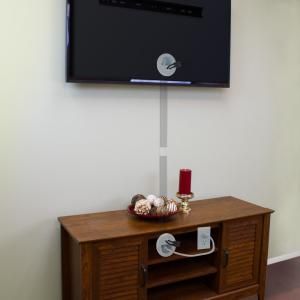Run Power Cord Inside Wall

While these can clean up things immensely there are other slightly more involved but still easy to install systems that allow the cables to be run behind walls.
Run power cord inside wall. It is perfectly safe to run most cables through a wall. It also makes it easier to change out cables as needed and ensures a clean signal path because you are only using one cable to complete the run. I like to use this setup for running just one or two cables like an hdmi cable up to a tv from an entertainment center located below. The most common cable management systems conceal wires behind molded plastic raceways that run along the walls and baseboard.
Feed the wires through the retro fit single gang box and then screw in the screws to secure them. No not worth the risk. Can the tv power cord or an extension cord be run inside the wall. Really the only cable you absolutely should not run through a wall is a standard power cable that plugs into an outlet.
Dragging extension cords across the yard to power the weed whip fumbling around in a dark shed most of us take these hassles for. This is useful for short under 5ft cable runs through the wall. National electrical code 400 8 rolls through the things you can t do with cord and it s mostly a list of schemes to use them as a substitute for the permanent wiring of a structure. 1 as a substitute for the fixed wiring of a structure 2 where run through holes in walls structural ceilings suspended ceilings.
Data cables on the other hand can go right into the wall cavity. It is against the national electrical code to connect extension cord wiring through a hole or opening in a wall inside a dropped ceiling or under flooring. Because we re only making an in wall extension cord there isn t any reason to turn off the power. By following a few simple steps you can run power from one room to another and economically get all the electrical power you need to the places where you need it.
The kit used in this guide is the ce tech cord and cable kit. These cables will heat up more than most other cables. We show the easiest way using rigid conduit. They can cause electrical fires if there is a cut or another issue with the cable or device.
Flexible cords and cables shall not be used for the following.














































